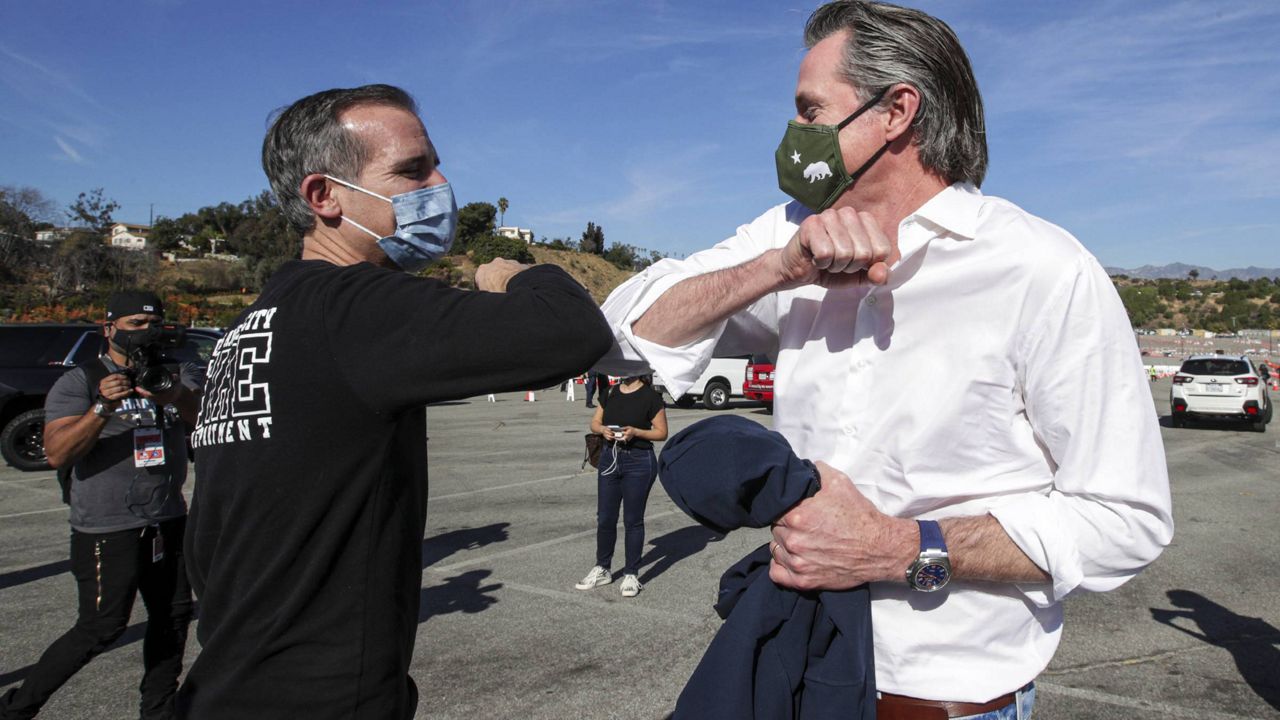SAN FRANCISCO (AP) — Los Angeles Mayor Eric Garcetti said many deaths could have been prevented if the state focused earlier on vaccinating those in the most disadvantaged neighborhoods, a tacit criticism of Gov. Gavin Newsom's decision to initially focus inoculation efforts by age and profession.
What You Need To Know
- Los Angeles Mayor Eric Garcetti said “a lot of deaths" could have been prevented if the state had focused earlier on vaccinating those in the most disadvantaged neighborhoods
- Garcetti also said Friday the federal and state governments haven’t given local officials like him enough freedom to inoculate who they feel are most at risk
- While the mayor didn't name Newsom, his comments ultimately are criticism of the governor and his initial tightly constrained approach to inoculating residents by age and profession
- Newsom has since pivoted and set aside 40% of all doses for people in the state's poorest areas
Garcetti also said he's eager for the day when the state and federal governments take “the handcuffs off us completely" and allow local officials to vaccinate those who they feel are most at risk.
“From a public health perspective, we should have gone in with surge teams to ZIP codes that were hardest hit (by the coronavirus) and just say, ‘Anybody in this ZIP code gets a vaccine,’ ” Garcetti said during an online interview with Harvard University's T.H. Chan School of Public Health. “And we could of — I think — really prevented a lot of deaths.”
Garcetti and Newsom are fellow Democrats and close friends. And while the mayor didn’t name Newsom, his comments ultimately are criticism of the governor’s approach, which were modified earlier this month when he announced 40% of all vaccine doses will go to people in the state’s most disadvantaged ZIP codes.
Newsom's office did not immediately respond to a request for comment.
Newsom came under harsh criticism from local officials when he announced in late January his plan to centralize vaccinations under a state system run by insurer Blue Shield. County officials felt they were being undercut, but more of them are coming on board now.
The state public health department announced Friday that the state’s two largest counties, Los Angeles and San Diego, have signed on to the plan. The governor’s office had initially planned for counties to sign contracts with Blue Shield, but they now are signing memorandums of understanding with the state.
California leads the nation in the number of COVID-19 cases and deaths, with the poor, as well as African Americans and Latinos, accounting for a disproportionately high number.
When vaccines first became available in limited form in December, California followed federal recommendations and allowed vaccinations only for health care workers and the elderly and others in nursing homes and other long-term care facilities.
Since then, Newsom has opened up eligibility to all people 65 and older as well as teachers, child care workers, farm and food workers, and emergency personnel. This week he added people with certain disabilities and underlying health conditions. On Friday, the governor said he expects to make everyone eligible for the vaccine by May 1 with supply ramping up.
Garcetti said he had joined other mayors in urging President Joe Biden’s administration to give vaccines directly to cities. He said the city could double the number of shots being provided, but supplies are constrained.
“L.A. city is bigger than 23 states. L.A. county is bigger than 45 states. But yet we still have to go through three layers of bureaucracy before we get our vaccines. That seems kind of silly at this time,” Garcetti said.
Paul Markovich, president and CEO of Blue Shield of California, said Friday that 38 of 61 local health jurisdictions have switched to the state's online appointment portal called My Turn. All but two are on track to do so.
“We feel like we’re getting making really good progress. We're on track in terms of implementing this transition by the end of the month," he said.
The largest county in the San Francisco Bay Area had refused to participate, saying it is doing a good job of dispensing vaccines to local clinics and targeting underserved communities. Santa Clara County Executive Dr. Jeff Smith said Friday that a memorandum of understanding that allows counties to reallocate or redistribute doses with state permission sounds promising.
“We still have major concerns about the MOU and the state system," he said. “The frustration we all have is that there’s not enough inventory, but adding more bureaucracy to it doesn’t seem to be the best idea to me.”
___



